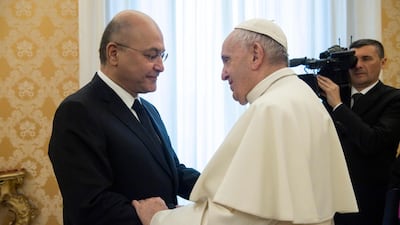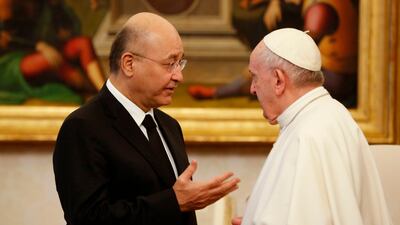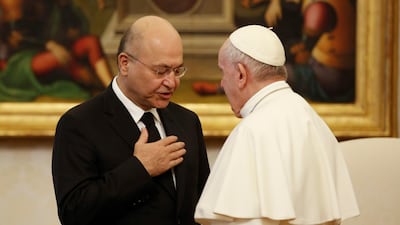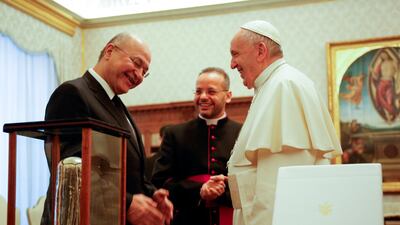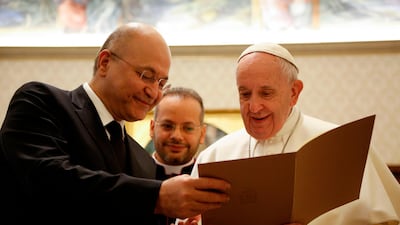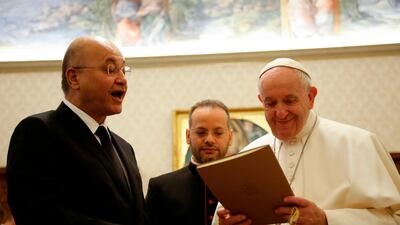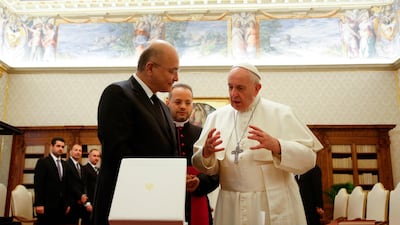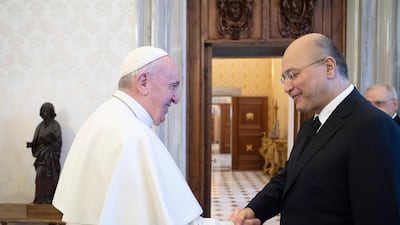A visit to Iraq by the leader of the world's Catholics will help to bring a spirit of unity and reconciliation to revive the war-torn country, a senior bishop told The National.
The visit from March 5 to 8 will be the first trip abroad by Pope Francis since the outbreak of the coronavirus pandemic.
It will also be the first time Iraq welcomes the sovereign of the Vatican City.
"Every step in this visit is significant and has its value in encouraging people to be united and work together to achieve peace," said Auxiliary Bishop Basel Yaldo of Baghdad, who is the Catholic Church's general coordinator for the trip covering four provinces.
Many of Iraq's Christians left the country following the US-led invasion of 2003, when sectarian warfare prompted them to flee. Attacks by ISIS on minority groups in 2014 delivered a major blow for Iraq's multi-denomination Christian communities, and many have not returned to their homes in Mosul and other cities.
From around 1.5 million Christians prior to the US-led invasion, only estimated 250,000 Christians remain in the country today.
“We hope to see the outcome of this visit [as helping] Iraq to be an open-minded nation, especially by restoring the spirit of youth to live happily together, building their country and securing a better future for the next generation,” Bishop Yaldo said.
The bishop is one of the two Auxiliary Bishops of Chaldean Patriarch Louis Raphael Sako.
“The visit will guarantee visibility to Christians by giving great significance and relevance to their presence in this part of the world and their suffering throughout history,” he said.
Iraq is home to many different eastern rite churches, both Catholic and Orthodox. The Catholic Church hopes the Pope's visit will encourage Iraqi Christians to return to their homes, he said.
The first papal visit to Iraq comes at the invitation of the Iraqi government, led by President Barham Salih and the head of Iraq’s Catholic Church, Cardinal Sako.
Baghdad described it as a “historic event” that sends a message of peace to Iraq and the whole region.
It will see Pope Francis stop in several cities across the country, including Baghdad, Erbil, Mosul and the ancient southern city of Ur, home of the patriarch Abraham, the father of the three monotheistic religions Christianity, Judaism and Islam.
“Ur is the highlight of the visit because Abraham represents the sign of unity for all of us who inhabit this land,” Bishop Yaldo said.
While there, Pope Francis will pray and meet representatives of all religions in Iraq to promote dialogue and coexistence.
“Seeing Abraham’s house will be a great symbol of unity for all religions that have this element in common,” he said.
The Pope had hoped to make the trip last year but his plans were cancelled, first by security concerns and then because of the coronavirus.
Bishop Yaldo said there were still concerns on these two elements but the Church’s main worry is to “secure the safety of everyone,” he said.
Pope Francis is also expected to meet Grand Ayatollah Ali Al Sistani in the southern holy city of Najaf.
The bishop said it would be a "private visit" between the two religious figures which the Church expects to be based on “solidarity and coexistence”.
“We are waiting for peace to prevail from this trip as Iraq has suffered immensely throughout the years,” he said.
The two religious figures are expected to sign a document on "human fraternity for world peace" – an interfaith text condemning extremism that Pope Francis signed with the leading Sunni cleric, the Grand Imam of Al Azhar, Sheikh Ahmed Al Tayeb, in 2019.
